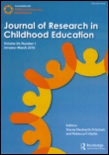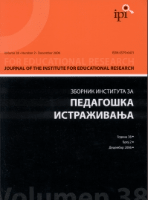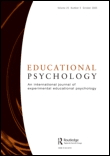
EUROPEAN JOURNAL OF PSYCHOLOGY OF EDUCATION
Scope & Guideline
Empowering educators with cutting-edge psychological research.
Introduction
Aims and Scopes
- Developmental and Cognitive Processes:
Research focusing on the cognitive and emotional development of learners, including studies on executive functions, metacognition, and the impact of socio-emotional factors on learning outcomes. - Educational Interventions and Practices:
Exploration of various instructional strategies and educational practices, including cooperative learning, formative assessments, and the effectiveness of different pedagogical approaches in enhancing student engagement and achievement. - Social and Contextual Influences:
Studies examining the role of social relationships, cultural contexts, and environmental factors on learning processes, including peer influences, parental involvement, and classroom dynamics. - Authenticity and Meaningful Learning:
Research that investigates the conditions under which learning experiences are perceived as authentic, exploring how authenticity influences engagement, motivation, and educational outcomes. - Inclusive Education and Diversity:
Focus on understanding and addressing the needs of diverse learners, including students with special educational needs, and promoting inclusive educational practices.
Trending and Emerging
- Impact of Technology on Learning:
Research exploring the role of digital tools and online learning environments has surged, particularly in the context of the COVID-19 pandemic, emphasizing the need for effective integration of technology in education. - Emotional and Psychological Well-being:
There is an increasing focus on the emotional aspects of learning, including studies on well-being, motivation, and the psychological impacts of academic stress, highlighting the importance of mental health in educational settings. - Collaborative and Cooperative Learning:
The exploration of collaborative learning strategies has gained momentum, as research demonstrates the benefits of peer interaction and teamwork in enhancing learning outcomes. - Social Justice and Equity in Education:
Emerging themes surrounding equity, inclusion, and social justice in educational practices are increasingly prevalent, reflecting a commitment to addressing disparities in educational access and outcomes. - Authentic Learning Experiences:
Research focusing on the design and implementation of authentic learning experiences that connect classroom learning to real-world contexts is trending, as educators seek to enhance student engagement and relevance.
Declining or Waning
- Traditional Testing Methods:
Research focusing exclusively on traditional assessment methods has declined as newer, more holistic approaches to assessment, such as formative and authentic assessments, gain traction. - Purely Quantitative Studies:
While quantitative research remains important, there is a noticeable decline in studies that do not incorporate qualitative insights, as mixed-methods approaches become increasingly favored for their comprehensive understanding of educational phenomena. - Static Models of Learning:
There is a waning interest in static models that do not account for the dynamic and context-dependent nature of learning, as researchers increasingly focus on ecological and system-based perspectives. - Single-Discipline Focus:
Research that is limited to a single discipline within educational psychology is decreasing, with a trend towards interdisciplinary studies that integrate insights from multiple fields. - Overemphasis on Individual Differences:
While individual differences in learning are still important, there is a shift away from focusing solely on these factors towards understanding interactions within social and contextual frameworks.
Similar Journals

Journal of Research in Childhood Education
Exploring the dynamics of childhood learning.The Journal of Research in Childhood Education, published by Routledge Journals, Taylor & Francis Ltd, is a prestigious academic journal that has been at the forefront of childhood education research since its inception in 1986. With an ISSN of 0256-8543 and E-ISSN 2150-2641, this journal serves an essential role in disseminating findings and discussions pertinent to the fields of developmental and educational psychology, as demonstrated by its notable rankings in the 2023 Scopus Ranks, placing it in the 66th percentile of Educational Social Sciences and 49th percentile in Developmental Psychology. With a current Q2 category quartile designation in both Developmental and Educational Psychology and Education, it aims to foster a deeper understanding of the complexities surrounding childhood education practices and policies. Researchers, educators, and students alike will find robust and insightful research that contributes to advancing educational theories and practices, supporting the journal's mission to enhance the overall quality of education for children globally. This journal continues to be a critical resource for individuals passionate about enhancing early childhood education and comprehending the developmental challenges faced by children today.

Psychology Society & Education
Illuminating the Pathways of Learning Through Psychological InsightPsychology Society & Education is a distinguished journal published by EDITORIAL UNIV CORDOBA-UCOPRESS, dedicated to exploring the intersections of psychology, education, and society. With an ISSN of 2171-2085 and an E-ISSN of 1989-709X, this Open Access journal has been providing freely accessible scholarly articles since 2009, ensuring a wide dissemination of knowledge within the academic community. Based in Spain, the journal ranks favorably in its categories, including Q3 in Clinical Psychology and Q3 in Education, illustrating its growing impact in these fields. Offering a platform for rigorous research, reviews, and discussions, Psychology Society & Education invites contributions that advance understanding of psychological principles applied within educational contexts and societal dynamics. Its role in bridging research with practical applications makes it an essential resource for researchers, professionals, and students aiming to contribute to the evolving discourse surrounding psychology and education.

EDUCATIONAL PSYCHOLOGY REVIEW
Empowering Educators with Evidence-Based ResearchEDUCATIONAL PSYCHOLOGY REVIEW is a premier journal published by Springer/Plenum Publishers, dedicated to advancing the field of educational psychology through rigorous scholarship and innovative research. Since its inception in 1989, this influential journal has played a pivotal role in disseminating high-quality research findings and theoretical insights, helping to shape the future of educational practices and psychological frameworks. With an impressive impact factor and a place in the Q1 quartile in both Developmental and Educational Psychology as well as Education, it ranks among the top journals in its field. Recent Scopus rankings further highlight its significance, placing it in the 99th percentile among education publications and the 98th percentile in developmental psychology. Although it is not an open-access journal, it maintains a strong commitment to accessibility through institutional subscriptions and partnerships. The EDUCATIONAL PSYCHOLOGY REVIEW invites researchers, professionals, and students alike to contribute and engage with the latest findings, fostering a deeper understanding of psychological principles in educational contexts.

Electronic Journal of Research in Educational Psychology
Unlocking the Potential of Educational ResearchElectronic Journal of Research in Educational Psychology, published by UNIV ALMERIA, serves as a vital platform for advancing research in the fields of educational psychology and developmental psychology. With an ISSN of 1699-5880 and an E-ISSN of 1696-2095, this journal has been disseminating scholarly work since its inception in 2003, contributing to an expansive collection of research that highlights current trends, methodologies, and theoretical developments up to 2024. Though it currently holds a Q4 in Developmental and Educational Psychology and a Q3 in Education according to 2023 category quartiles, it is steadily increasing its visibility among the scholarly community, reflected in its Scopus rankings within the 33rd percentile in Social Sciences Education and 21st percentile in Developmental and Educational Psychology. This open-access journal not only enhances accessibility to quality research but also aims to bridge the gap between theory and practice in educational settings. By fostering an environment of collaboration and interdisciplinary dialogue, it stands as an essential resource for researchers, professionals, and students striving to enrich their understanding of educational psychology.

LEARNING ENVIRONMENTS RESEARCH
Decoding the Elements of Successful Learning EnvironmentsLearning Environments Research, an esteemed journal published by SpringerNature, occupies a pivotal position in the fields of Education, Communication, Developmental and Educational Psychology, and E-learning. With an ISSN of 1387-1579 and an E-ISSN of 1573-1855, this journal has demonstrated its scholarly impact, boasting a Q1 ranking in key categories according to the 2023 metrics. Its Scopus rankings further underscore its relevance, placing it in the top 10% of journals in Communication and 90th percentile among journals in Developmental and Educational Psychology. Learning Environments Research is dedicated to advancing the understanding of learning environments through innovative research and critical analysis, providing a platform for scholars, educators, and practitioners to explore effective educational practices. While currently not offered as an open-access publication, researchers can access a wealth of knowledge that reflects contemporary issues and research trends in education, ultimately fostering improved learning experiences worldwide. The journal’s ongoing commitment to excellence in research and its international perspective make it a valuable resource for anyone seeking to deepen their understanding of learning environments.

Zbornik Instituta za Pedagoska Istrazivanja
Exploring New Frontiers in Pedagogical TheoryZbornik Instituta za Pedagoska Istrazivanja, an esteemed journal based in Serbia, serves as a crucial platform for scholarly work in the field of Education. Published by the Institute for Educational Research, this Open Access journal has been committed to disseminating innovative research since 2002, providing a vital resource for educators, researchers, and students alike. With the latest ranking placing it in the Q3 category for Education in 2023, and a Scopus ranking at #1342 out of 1543 in the Social Sciences Education category, the journal demonstrates its potential for impactful contributions to educational theories and practices. The journal's commitment to advancing pedagogy and fostering educational improvement makes it an essential addition to any academic library and offers valuable insights that engage the global education community. Access its wealth of knowledge at [Zbornik Instituta za Pedagoska Istrazivanja](https://examplelink.com), and join the ongoing dialogue shaping the future of education.

Educational Psychology
Transforming education with cutting-edge psychological insights.Educational Psychology is a leading peer-reviewed journal published by Routledge Journals, Taylor & Francis Ltd, dedicated to advancing the field of educational and developmental psychology. With its ISSN 0144-3410 and E-ISSN 1469-5820, this esteemed journal provides a platform for innovative research and critical discussions that explore the psychological aspects of learning processes, educational interventions, and cognitive development. Recognized for its quality, it holds an impressive Q1 category ranking in various fields, including Developmental and Educational Psychology, and is ranked in the top 10% of its category in Social Sciences Education and Experimental Psychology according to Scopus Metrics. Spanning from 1981 to 2024, the journal not only publishes rigorous empirical studies but also theoretical articles that contribute significantly to the understanding of educational practices globally. Researchers, educators, and students alike will find this journal an invaluable resource for cutting-edge developments in the intersection of psychology and education, enhancing their academic pursuits and professional growth.

Revista Publicaciones
Championing scholarly excellence in the heart of Granada.Revista Publicaciones, published by EDITORIAL UNIV GRANADA, stands as a vital resource for researchers, educators, and students engaged in the fields of educational and developmental psychology. Since its inception in 2001, this Open Access journal has aimed to disseminate high-quality, peer-reviewed research to foster a deeper understanding of psychological principles and educational practices. Hailing from Granada, Spain, the journal emphasizes its commitment to accessibility and scholarly excellence, as evidenced by its presence in Scopus with respectable rankings in both Developmental and Educational Psychology and Education. With its Q4 category ranking in 2023, the journal is dedicated to bridging research gaps and encouraging innovation in a rapidly evolving discipline. Through a convergence of insights and methodologies published yearly, Revista Publicaciones continues to be an essential outlet for advancing educational psychology research and practice.

CONTEMPORARY EDUCATIONAL PSYCHOLOGY
Innovating Educational Practices through ResearchCONTEMPORARY EDUCATIONAL PSYCHOLOGY, published by Academic Press Inc. Elsevier Science, stands as a leading journal in the fields of developmental and educational psychology. With an impressive impact factor and ranked in the Q1 category for both Developmental and Educational Psychology and Education, it is recognized as a top resource for researchers and professionals seeking to explore the complexities of learning, development, and educational practices. The journal has been disseminating groundbreaking research since 1976 and continues to be relevant through 2024, showcasing innovative studies that inform educational theory and practice. Although the journal operates under a subscription model, it provides unparalleled insights and comprehensive reviews that cater to a diverse audience, including researchers, educators, and students. The rigorous peer-review process guarantees the high quality of published work, while its Scopus rankings affirm its significant contribution to the academic community, with standout positions in both the fields of social sciences education and developmental psychology. For those committed to advancing the intersection of psychology and education, CONTEMPORARY EDUCATIONAL PSYCHOLOGY is an indispensable scholarly resource.

Social Psychology of Education
Exploring the dynamics of learning through a social psychological lens.Social Psychology of Education is a prestigious academic journal published by Springer, dedicated to advancing the understanding of social psychological processes within educational contexts. With an ISSN of 1381-2890 and an E-ISSN of 1573-1928, this journal has established its prominence in the field, evidenced by its Q1 rankings in multiple categories, including Developmental and Educational Psychology, Education, Social Psychology, and Sociology and Political Science for 2023. It ranks within the top percentiles of Scopus listings, reflecting its influential impact on the research community. Spanning from its inception in 1996 to the present, this journal aims to publish high-quality, empirical, and theoretical studies that explore the intersection of social psychology and education, fostering a deeper understanding of how social factors affect learning environments and educational outcomes. Although it does not currently offer open access, researchers, professionals, and students leverage its findings to inform practice and policy-making in educational settings. Located in Dordrecht, Netherlands, the journal continues to be a vital resource for those interested in educational psychology and sociological perspectives on learning.